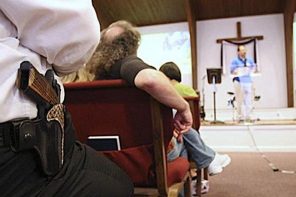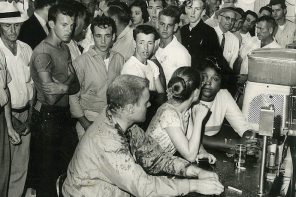After watching Pres. Obama’s speech in Cairo, I was pleased to see he addressed some of the points I hoped he would. He began with the traditional greeting of the Arab and Muslim worlds, as-salam alaykum (peace be upon you). He then talked about the importance of Al-Azhar University, the problem of settlements, Sunni-Shi’ah conflict, interfaith history, the history of Muslims in America, and rule of tyrany under the guise of democracy. Of course, he touched on much more and in much more depth. It is worth looking at the content of his speech in more detail. Although he speaks as a politician, but by choosing the construction of addressing Muslim communities, rather than Egyptians or Arabs, he must turn to a religious language. There are resonances that exist in the speech for both Islamic history and American history, and understanding both makes his speech that much richer:
For over a thousand years, Al-Azhar has stood as a beacon of Islamic learning; and for over a century, Cairo University has been a source of Egypt’s advancement. And together, you represent the harmony between tradition and progress.
This combination of past and present also implies the long engagement amongst civilizations. Al-Azhar is considered one of the earliest models of a university, which the Europeans adopt. In Europe, the institution is reworked and the modern university is created. This modern creation is then exported back to Egypt in the form of Cairo University. There is a cyclical nature of trade and the flow of ideas that Pres. Obama hints at. This time of crisis cannot define all past and all future interactions.
The relationship between Islam and the West includes centuries of coexistence and cooperation, but also conflict and religious wars. More recently, tension has been fed by colonialism that denied rights and opportunities to many Muslims, and a Cold War in which Muslim-majority countries were too often treated as proxies without regard to their own aspirations. Moreover, the sweeping change brought by modernity and globalization led many Muslims to view the West as hostile to the traditions of Islam.
It is important to note that there is a recent history of domination, directly through colonization, and indirectly through Cold War proxies. However, Pres. Obama avoids the trap of saying that all ills of the Muslim world are the fault of non-Muslims. He recognizes that in an interconnected world, no people operate in a vacuum. Although he does mention the challenge of modernity, the mistake in that phrase is that he conceives of only one modernity. The fact of the matter is that amongst Muslims there is not a universal rejection of modernity, but there are different conceptions of what the modern is. These differing conceptions of the modern are an important part of misunderstandings. The privileged language of only one modernity is presumptuous and alienating.
As the Holy Koran tells us, “Be conscious of God and speak always the truth.” [33:70]
This particular verse comes after a long section chastising those who disbelieved in Moses and his message. It ties nicely to the idea of Holocaust denial Pres. Obama brings up later in his speech. He then emphasizes the connections amongst civilizations again, some of which echo sentiments made earlier here. After talking about the contribution of Muslims to America, oddly ignoring the large number of Muslim slaves, he points to Muslims saying that we have a responsibility as well. He is right. A dialogue requires two parties. Stereotypes exist on all sides and we must address them. The result of ignoring our share responsibility is fratricide. He continues in this vein, “and if we understand that the challenges we face are shared, and our failure to meet them will hurt us all.…When innocents in Bosnia and Darfur are slaughtered, that is a stain on our collective conscience.” He then implicitly references the Qur’an again, to suggest it’s not about creating a world where everyone is the same, but where difference is meaningful without being divisive:
And this is a difficult responsibility to embrace. For human history has often been a record of nations and tribes — and, yes, religions — subjugating one another in pursuit of their own interests. Yet in this new age, such attitudes are self-defeating. Given our interdependence, any world order that elevates one nation or group of people over another will inevitably fail. So whatever we think of the past, we must not be prisoners to it. Our problems must be dealt with through partnership; our progress must be shared.
Now, that does not mean we should ignore sources of tension. Indeed, it suggests the opposite: We must face these tensions squarely. And so in that spirit, let me speak as clearly and as plainly as I can about some specific issues that I believe we must finally confront together.
Compare this to verse 49:13 of the Qur’an which says God created nations and tribes so that we may know one another and the most noble is the one who is best in their conduct. The allusion is quite obvious, and is geared towards at Muslim audience, encouraging them to respect diversity and to do good. He directly quotes this verse at the end of the speech.
The specific policy issues deal very pragmatic issues, but once more quotes the Qu’ran – 5:32 – when he talks about the taking of innocent lives. The entire verse is an affirmation to what was given to Jews, and the line he quotes is easily recognizable to students of the Talmud. In the middle of these items, Pres. Obama returns to some of his more abstract rhetoric when he says:
This last point is important because there are some who advocate for democracy only when they’re out of power; once in power, they are ruthless in suppressing the rights of others. (Applause.) So no matter where it takes hold, government of the people and by the people sets a single standard for all who would hold power: You must maintain your power through consent, not coercion; you must respect the rights of minorities, and participate with a spirit of tolerance and compromise; you must place the interests of your people and the legitimate workings of the political process above your party. Without these ingredients, elections alone do not make true democracy.
This section is highly evocative of Ali ibn Ali Talib’s letter to his Egyptian governor, a section of which is quoted in this article. Although he does mention Cordoba as a center of tolerance, I found it odd he did not mention Fatimid Cairo as well. Although less well-known, it was a strong center of Jewish life as well, and the current discrimination against Copts has little historical precedent. It would have been a good reminder to the Egyptian population as well. At the end of a section on religious freedom, he says “We can’t disguise hostility towards any religion behind the pretence of liberalism.” He is quite clear that we must work together; the problems of religious freedom exist not only in Muslim-majority countries, but in so-called liberal states. He moves on to tying us together by talking about the challenges of modern technology and the flow of ideas, with the challenges difference brings. The fear of the new is not unique to Muslim-majority countries
The Internet and television can bring knowledge and information, but also offensive sexuality and mindless violence into the home. Trade can bring new wealth and opportunities, but also huge disruptions and change in communities. In all nations — including America — this change can bring fear. Fear that because of modernity we lose control over our economic choices, our politics, and most importantly our identities — those things we most cherish about our communities, our families, our traditions, and our faith.
The end of the speech has people saying he gave a sermon. To certain extent, it was. However, to a Muslim audience, it was a wa’z. As distinct from a khutbah, or Friday sermon, a wa’z can happen at any time, and is not as heavy on religious texts. It takes what you know and has you think about it in new way. Pres. Obama’s speech is an example of rhetorical craft, speaking to multiple audiences at the same time. There were the words to the text, and then there was the meaning. He layered meaning upon meaning, and in each layer was as hook for all interested parties to act upon.



